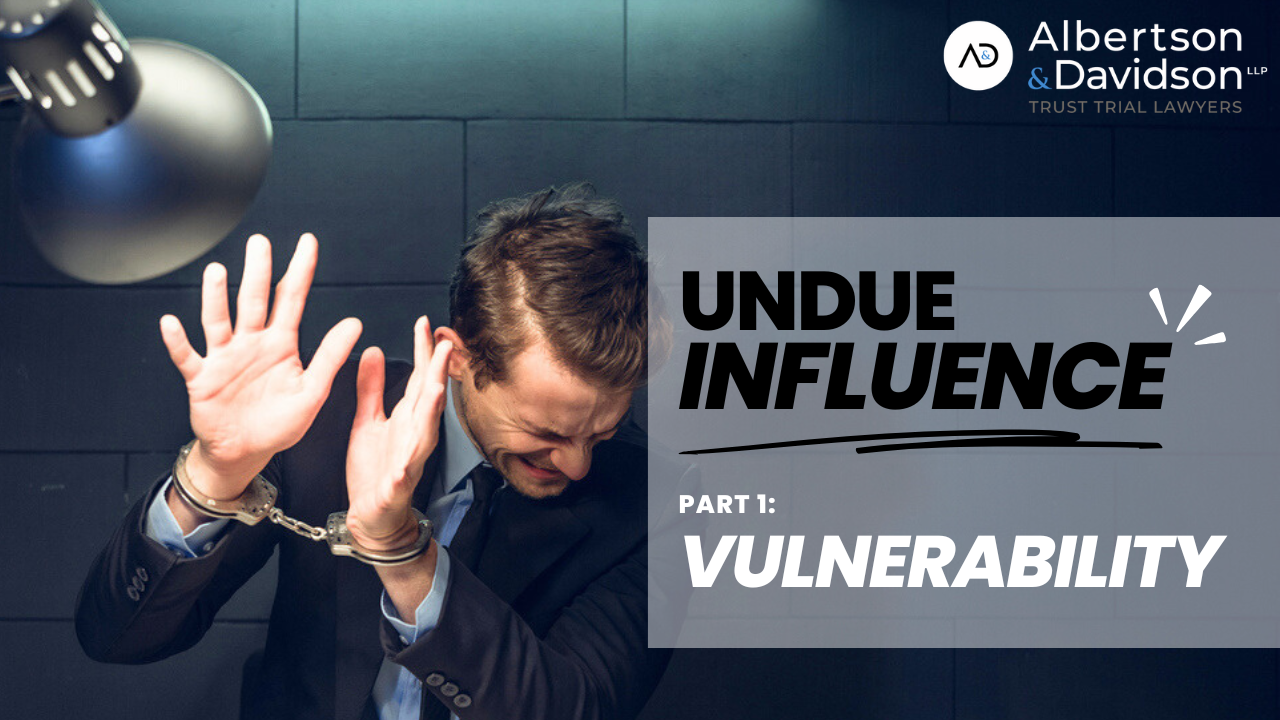
For purposes of undue influence, a person may be considered to be vulnerable (or susceptible) to undue influence based on incapacity, illness, disability, injury, age, education, impaired cognitive function, emotional distress, isolation, or dependency. These factors in conjunction with whether the influencer knew or should have known of the alleged victim’s vulnerability, play a role in determining undue influence.
Undue Influence by the law
Undue influence means excessive persuasion that causes another person to act or refrain from acting by overcoming that person’s free will and results in inequity. There are four factors under California Welfare and Institutions Code section 15610.70 required to prove undue influence. They are:
- vulnerability of the victim
- the influencer’s apparent authority over the victim
- the influencer’s action and tactics, and
- the equity of the result.
When it comes to the vulnerability of the victim, the most telling facts point to someone who is in no position to withstand the excessive persuasion used by the undue influencer. The most obvious example is an elder who is suffering from the effects of dementia, Alzheimer’s disease, or stroke. Each of these conditions can have a profound effect on mental cognition and functioning, so as to create a vulnerable victim who cannot withstand excessive persuasion. Dementia and stroke are not the only bases on which to find a victim vulnerable.
Physical limitations determining vulnerability
Tellingly, the California legislature recognized that other physician conditions can create vulnerability. Take for example a person who is bedridden due to a debilitating physical problem. While they may be debilitated, their mental functioning may be perfectly fine. They may rely on a family member or caretaker for their food, medication, and personal hygiene needs. If they were to anger the family member or caretaker, then they may fear being cut off from the help they need for daily living. In this scenario the victim is vulnerable because their ability to withstand and fight against excessive persuasion is limited due to their dependence on the help the family member or caretaker is providing.
Elder issue
The same can be true for a person based solely on age. Their mental function may be diminished, but not to the level of a lack of capacity. With age comes restrictions such as an inability to shop for food, medication, and other necessities, or be as mobile as they once were. This can lead to a situation where an undue influencer can engage in excessive persuasion that would be impossible for the elder to resist.
Then again sometimes elders change their minds, act impulsively, anger quickly, or make knee jerk decisions to change their trust or will distribution plans that seem to make little sense to the children and/or family members who are affected by the changes. Where an elder makes changes based on their own free will, that is allowed. But a change based on an undue influencer overcoming an elder’s free will is undue influence.
How do you prove a change to a trust or will was caused by undue influence and not the free will of the elder? That’s where you have to hire an experienced law firm that knows how to handle a trust or will contest based on undue influence.
Don’t be an abused beneficiary

Our attorneys have taken action against hundreds of trustees for abusing their beneficiaries. We’ve also recovered more than $300 million and helped hundreds and hundreds of clients regain their dignity as a trust or will beneficiary through litigation – if you believe you’ve been the victim of inheritance abuse, tell us your story to see if your case qualifies for a free consultation. We’re here to stand, fight and win for you.
Call (877) 408-3813 or reach out online to consult a trust contest lawyer.

